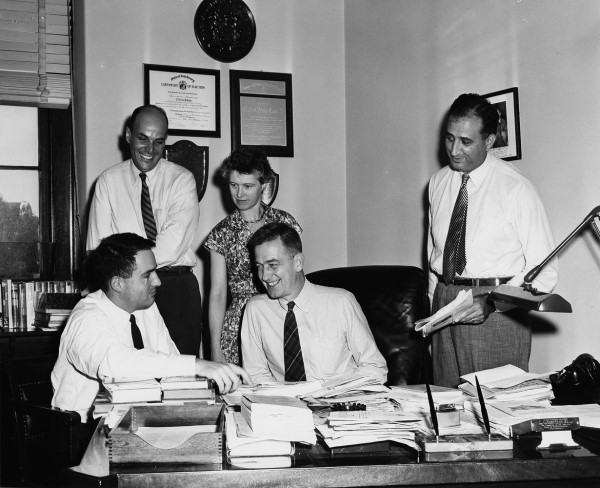United States Senator
Although retaining their residence in Rahway, Senator Case, his wife, and teenage son Clifford III moved to a townhouse in Georgetown in early 1956. In the late 1950s, Case set himself apart from other senators by advocating the disclosure of financial assets by members of Congress and senior officials of the executive branch and by regularly introducing legislation for such disclosure. According to Case, one of his most important accomplishments was his endorsement of U. S. attorneys for New Jersey who fought corruption and organized crime. Later in his career, Case was active in asserting the role of the Senate in limiting excessive, and often secret, expansions of executive branch powers. In 1972, President Nixon signed the Case Act, requiring the U. S. president to submit to Congress the texts of executive agreements within sixty days of their signing.
The senator was tireless in his efforts to pass civil rights legislation. He collaborated with a group of centrist Republicans and members of the Democratic majority to secure passage of the 1957 Civil Rights Bill, the landmark 1964 Civil Rights Act, and the Voting Rights Act. Case's voting record demonstrated his commitment to helping those in need, whether ethnic or religious minorities, women, the elderly, the infirm, workers, or students.
Human rights and international affairs were central themes of Case's work, particularly in the Senate Foreign Relations Committee, where he rose to the position of ranking minority member. A supporter of U. S. efforts to contain the spread of Communism, Case shifted his views on U. S. policy in Vietnam following a fact-finding trip there in 1967. During the late 1960s and early 1970s, he co-authored amendments seeking to end U. S. involvement in Vietnam. Later, Case and New Jersey House colleague Millicent Fenwick co-sponsored legislation creating a U. S. commission to monitor compliance with the human rights provisions of the Helsinki Accords, which President Ford signed into law in 1976.
A very strong supporter of Israel, Case represented the U. S. Congress at the opening of the Israeli Knesset in 1966. He later became an outspoken critic of the Carter Administration's efforts to sell U. S. warplanes to Egypt and Saudi Arabia in 1978. During his final term in the Senate, Case's behind-the-scenes efforts on the Senate Foreign Relations Committee brokered a key compromise that facilitated Senate ratification of the Panama Canal Treaty.
Case was also a strong advocate for conservation and environmental protection. He proposed the creation of a cabinet-level office to advocate for the environment, helped secure funds for parks, preserves, and recreational areas in New Jersey, and opposed ocean dumping off the Jersey Shore.

From 1955 until 1979, Case would represent New Jersey in the U. S. Senate, where he earned a national reputation for honesty, integrity, bipartisanship, and thoughtful decision-making that set a standard for his peers.
